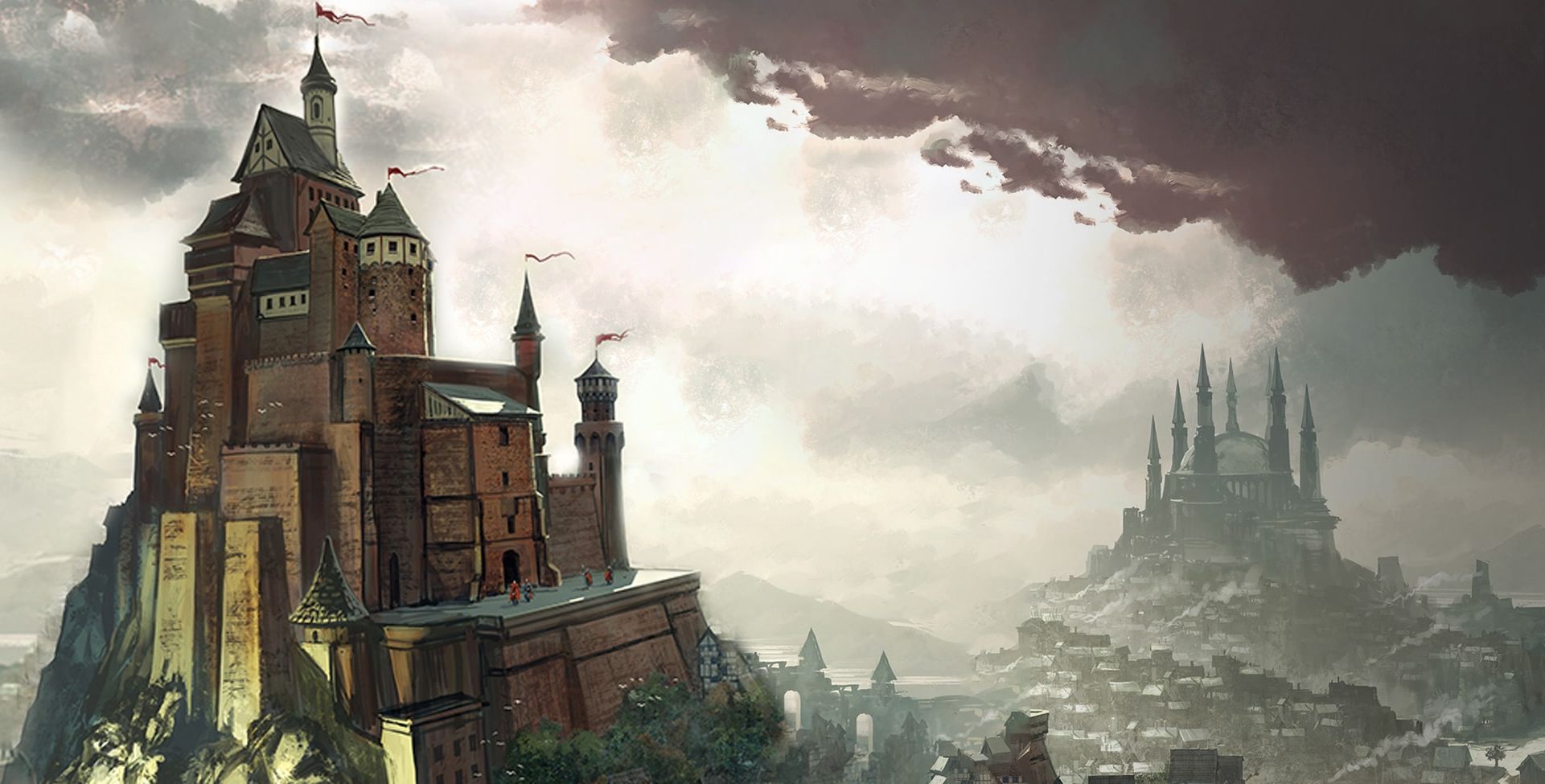Our Verdict
A functional, basic board game port isn't enough to truly shine off the tabletop.
PC Gamer's got your back
What is it? A game of cutthroat politics and strategic maneuvers.
Expect to pay $20/£16
Release date Out now
Developer Dire Wolf
Publisher Asmodee Digital
Reviewed on AMD FX-8350, Nvidia GeForce GTX 1070 Ti, 32GB RAM
Multiplayer Up to six
Link Official site
More than just a game for fans, A Game of Thrones: The Board Game is a definitive medieval strategy game. At least on the tabletop, where it's 17 years old and on its second edition. The reasons it's popular translate well to the digital edition if you bring your own friends, but the multiplayer infrastructure just isn't set up for pickup play via matchmaking. It's also hampered by a mediocre user interface and slow game speed in singleplayer.
With its basics cribbed from enduring classic Diplomacy, A Game of Thrones is a matter of negotiations between players—negotiations entirely unenforceable within the game rules. All orders are given secretly, and battles can be highly unpredictable without numerical advantage, which is difficult to muster. In its basics it's a strategy game, but in play it's knife-edge social bargaining and deception. Everyone lies, everyone breaks bargains, and everyone stabs the others in the back. Only one person can win by being first to get seven castles, but you can't win without bargaining.
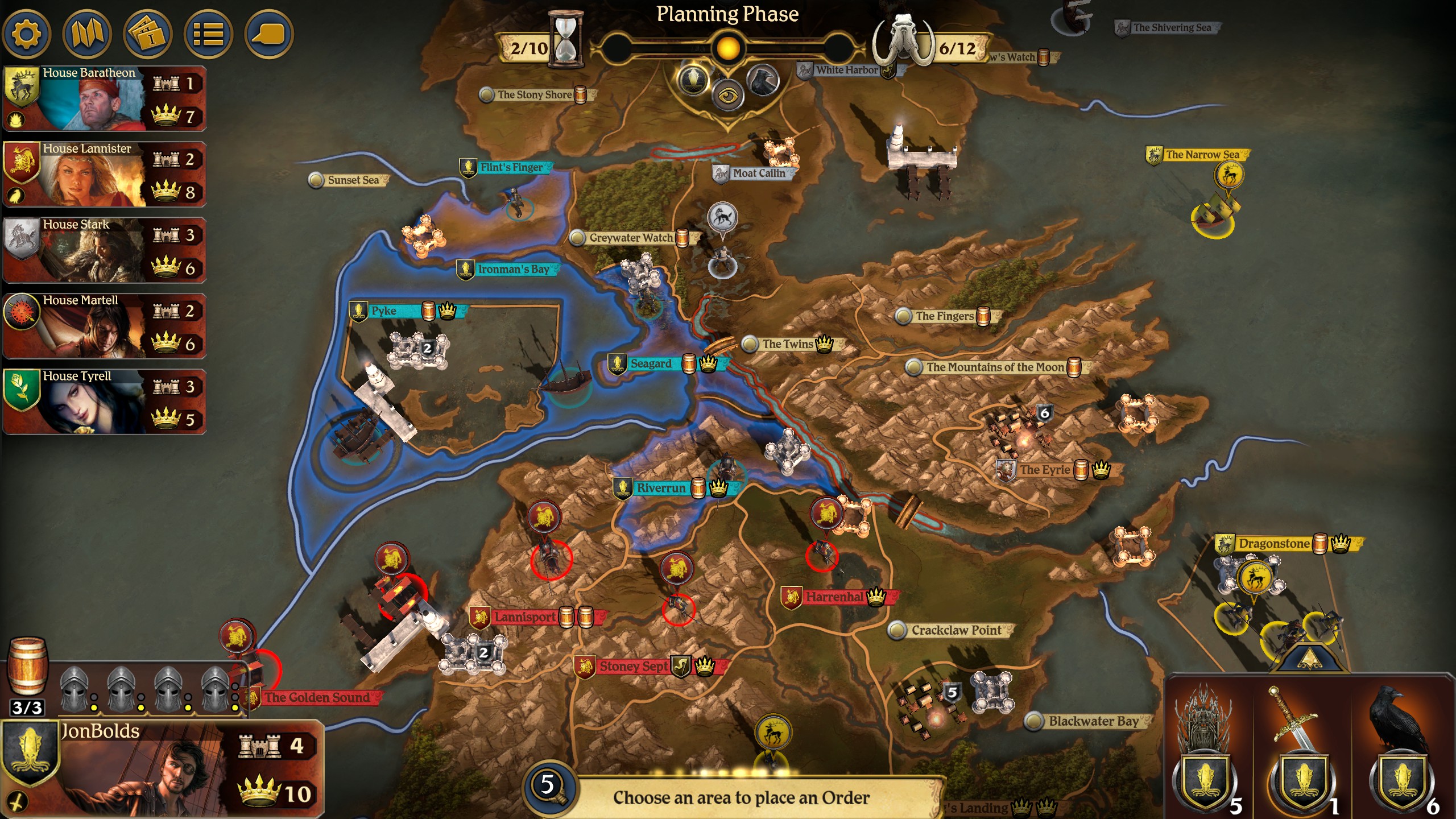
Each round players secretly give orders to every region on the map with their troops in it: They move to another region, defend, support other troops, consolidate power to gain resources, or raid to disrupt enemy orders. I might order my knights to march into enemy territory, my ships to support the attack, and my infantry to raid and disrupt the enemy's defenses before I go in. The effectiveness and variety of orders is often determined by one of three power tracks, which no one house can be the master of: Iron Throne, Fiefdom, and King's Court. The holder of the Iron Throne breaks ties outside of combat, the holder of Fiefdom breaks ties in combat, and the master of the King's Court gets to change an order after they see what others are doing.
Combat is simple and deterministic. You add up the strength of the units involved and add one of the character cards from your hand for a total. Hands are open, so you always know whether you can win a fight or not. An option, deeply divisive among players, adds some randomness to fights, but not enough to sway them if one side has overwhelming advantage.
Orders are the only thing you can truly control. Recruiting units, gaining lots of resources, and pushing yourself up the political turn-order and power tracks are all down to draws of random event cards at the start of each round. Some factions can rely on these draws to win or lose, and if the card you want doesn't show up until round five then tough luck.
The simplicity of the rules is generally to its credit. Equal-sized forces will often stalemate, and your soldiers and ships are precious commodities it's not easy to get more of, so the choice of when and where to fight is crucial. Each territory is only going to give you some of what you need out of the three main resources: Supply, power, and strongholds. It's tightly balanced so that no one player can overwhelm another without their full army, but you can't focus your full army on another player without leaving yourself open to the other houses. The only choice then, is to strike uneasy alliances for temporary goals. The enemy of your enemy is never your friend, but maybe you can jointly murder the common foe first.
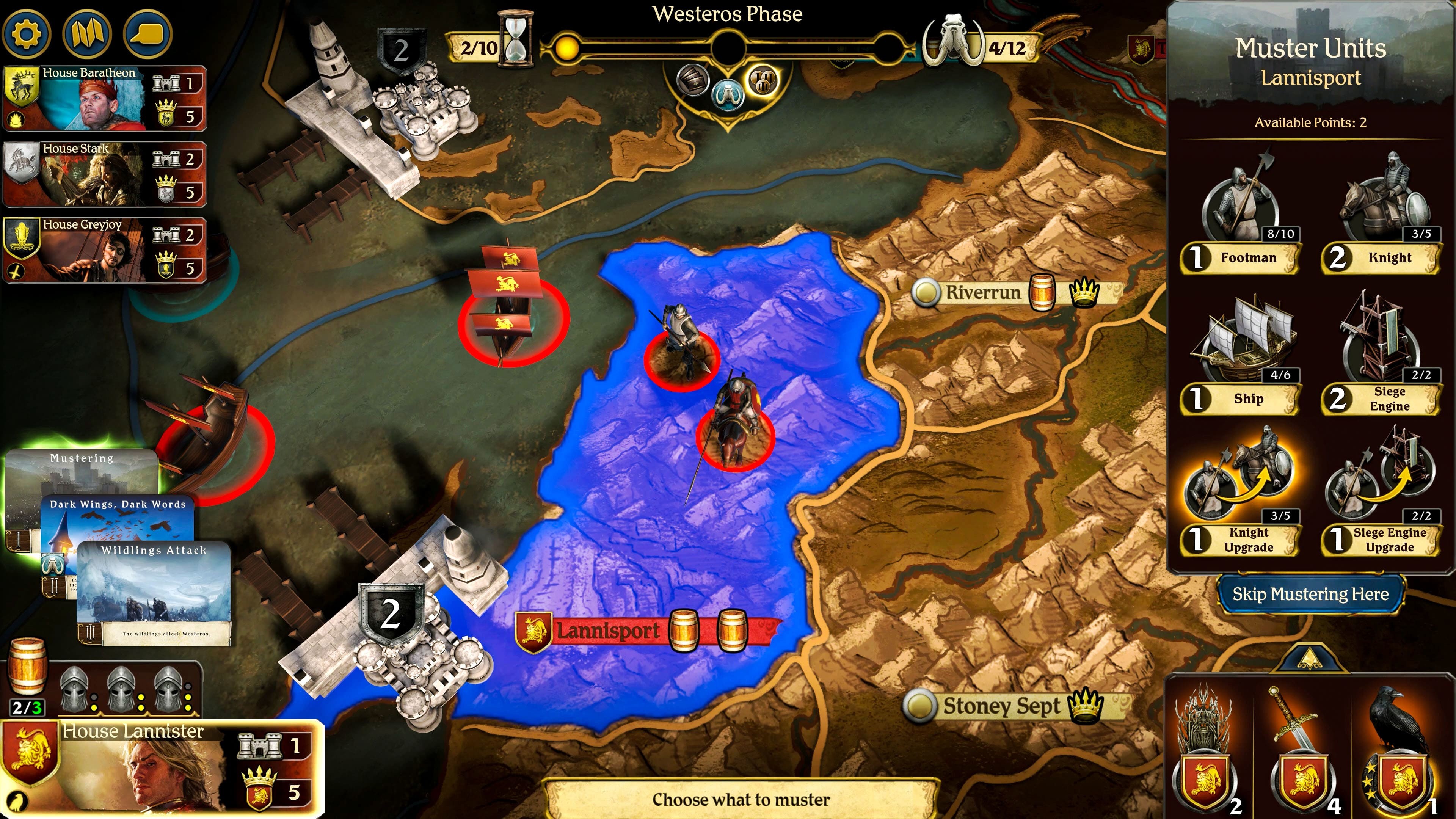
But it's not a lot to cut your teeth on if you want deep simulation and mechanically complex strategy. It's more of a planner and plotter's strategy game than a logistician or thinker's.
The simplicity of the digital version, however, is generally not to its credit. It's a pretty barebones but functional implementation of the tabletop game. Functional, not fancy. It doesn't reconsider much of the game design, nor how it's presented, to rework that for a digital medium. The map itself is a simple, static image with some low-poly models plopped on top. It's an underwhelming centerpiece for an epic conflict and doesn't compare to the sprawling and table-dominating experience of the board game.
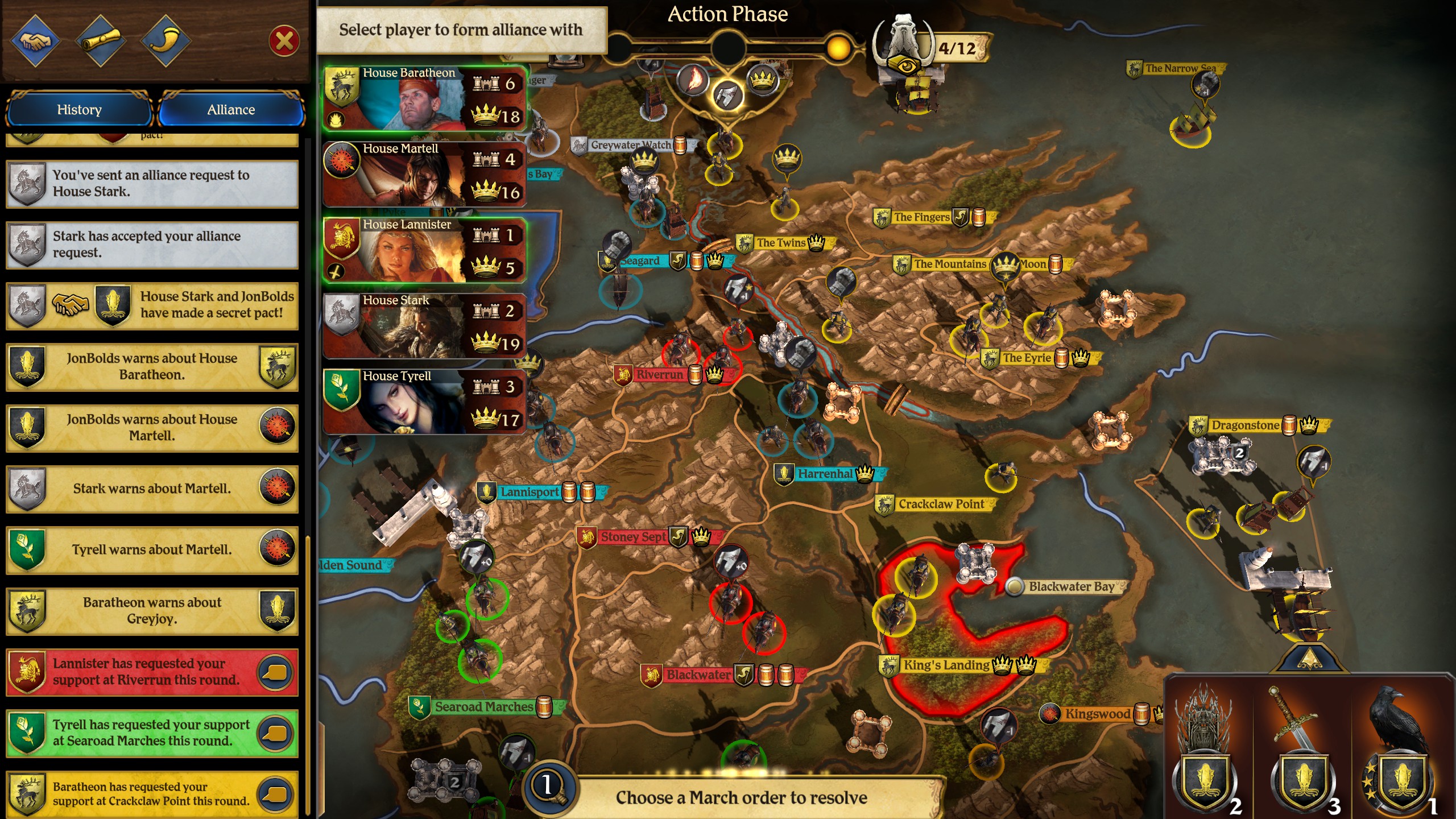
The interface is huge, clunky, and can't be scaled or altered. Chunks of it dominate the screen, which feels like even more of an attempt to distract from the sad map. It's set up more like a tablet game than a computer game.
What really kills the experience, though, is the speed. You have to watch every action taken by each of the six factions each turn—you even have to watch them decide to refuse the ones they don't take. The camera pans up to their action, the soldier marches or the combat resolves or the raid occurs, complete with animation. In multiplayer this makes sense, as the actions of human opponents are inherently interesting, but against the AI it draws out what could be 20-minute matches into hour-long affairs.
I read a book while the AI turns resolved which is, to be frank, as damning a thing as I can say about a game.
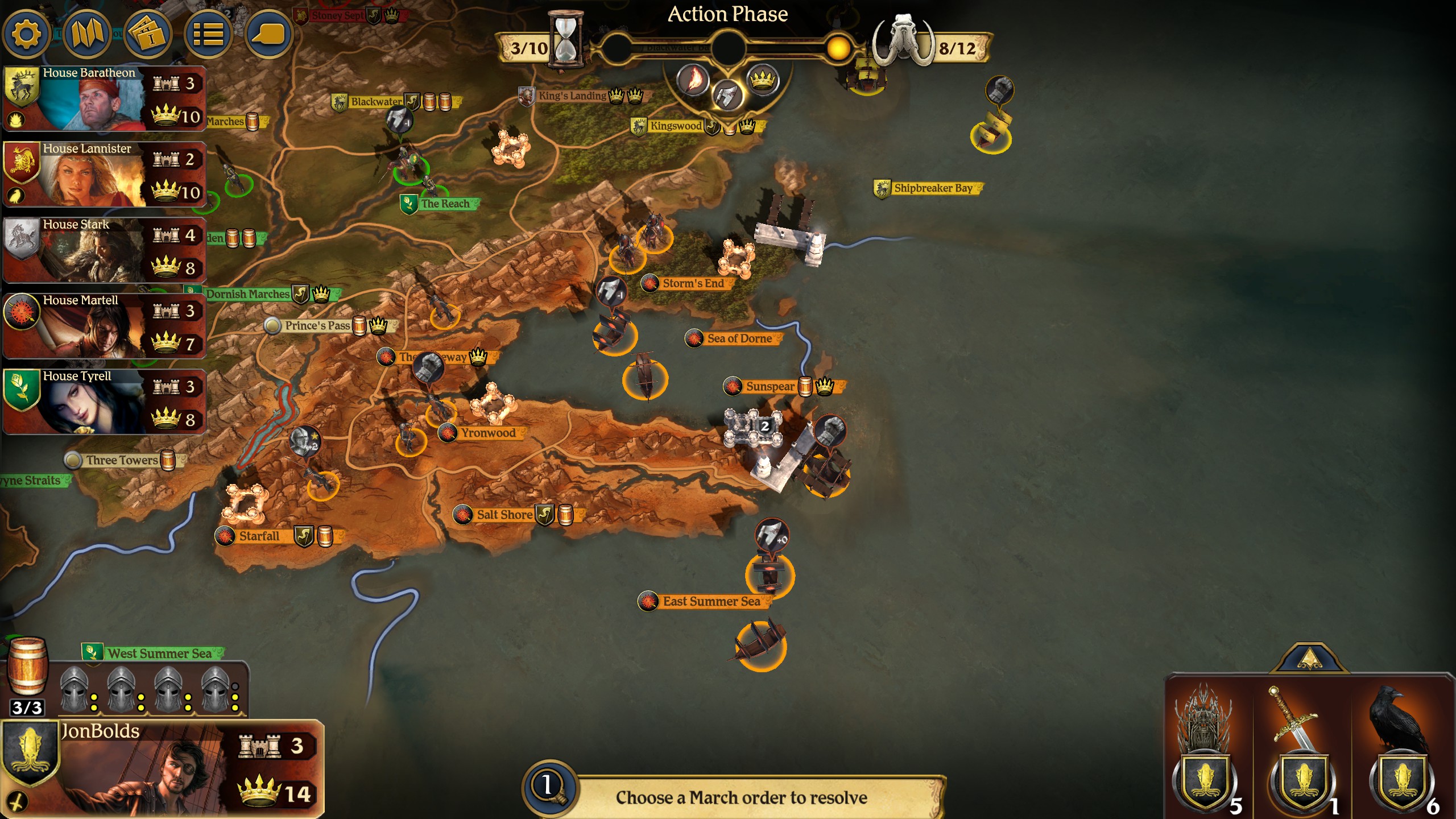
Playing against the AI is otherwise as interesting as it could be, which is a pleasant surprise. It fights hard in normal Skirmish matches, and especially understands how to punish players who overextend themselves. You can even do some rudimentary diplomacy with it by pointing out threatening leaders or making vaguely committal non-aggression pacts.
Singleplayer is most interesting in the Challenge scenarios, however, a series of missions that force you into puzzle-like circumstances with goals outside the normal victory conditions. It's a shame there are only challenges for four of the six houses, and only 10 challenges total.
Playing with other people is the heart of A Game of Thrones, and the social aspect—the bargaining, wheeling, and dealing—has made it enduringly popular. The truth is that it's just hard to do the kind of negotiating and backroom dealing that make A Game of Thrones fun without setting up separate voice chat channels, and there's no way to facilitate that without a deeply invested group.
What that means is that A Game of Thrones is great with friends, but the matchmaking is inadequate to the task of making it fun with strangers. Further, there's no delineation between synchronous or asynchronous play matches, so games are consistently held up by single players—and persistent bugs that can crash games several hours in.
Social games only work on PC because of either voice chat or robust text chat for asynchronous play. So even with premade signals and text chat, A Game of Thrones: The Board Game - Digital Edition just doesn't get there.
A functional, basic board game port isn't enough to truly shine off the tabletop.
Jon Bolding is a games writer and critic with an extensive background in strategy games. When he's not on his PC, he can be found playing every tabletop game under the sun.
